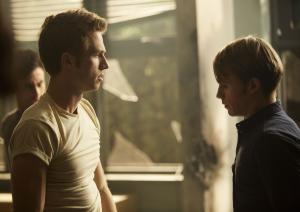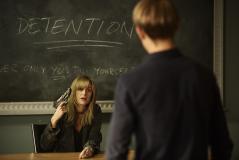Class Series One - Episode 7 - The Metaphysical Engine, Or What Quill Did
Starring: Katherine Kelly, Sophie Hopkins, Greg Austin,Fady Elsayed, Vivian Oparah, Jordan Renzo,
Pooky Quesel and Chike Okonkwo.
Writer: Patrick Ness
Director: Wayne Yip
Producer: Derek Ritchie
Executive Producers: Brian Minchin,
Patrick Ness, and Steven Moffat
Released Online (BBC Three) - 26th November 2016.
This review contains spoilers.This review contains spoilers.
Thankfully, this week we get a much more grown up episode, with the students only book ending the episode. We all saw in last weeks episode, Quill come into the classroom and save the hapless Charlie, seemingly for the very last time. This episode covers the time of the detention from Quill's perspective. So what did the character do while the kids were removed from space and time? Quite a fair bit actually.
Episode 7 essentially starts with Quill striding down the school corridor, away from the detention that she had so kindly arranged for the rest of the Scooby gang (well Class does want to be Buffy!). She meets up with the mysterious headmistress who summons up Ballon, a hulk of a man with strange scarring on his face and a bad case of heterochromia (it's a thing - look it up!). The head promises that she can remove Charlie's hold over Quill, and that Ballon will be the man who can perform the surgery. The bad news is that the procedure might kill her. Quill agrees and the trio are teleported inside what is essentially a tiny TARDIS, which whisks them away to find the tools that Ballon needs for the job.
The first stop is a calm and leafy world, that is the mythical heaven of the Arn, the small, telepathic creature that has been planted into Quill's brain that enables Charlie to control her. The first ingredient that they need is essence of Arn, which Ballon quickly acquires.The next stop is Ballon's mythical hell. A place of stone and petrified figures. They quickly get the third ingredient, which is (rather awkwardly) a blood sample from Ballon's God. The next stop is the Quill's mythical afterlife, where they need the first Quill's head. Once they have all three ingredients, it's back to Coal Hill academy where Ballon performs the extraction with his finger (the man is a shapeshifter). Is the procedure a success, well yes we know it is as this was the reveal that closed the last episode, but my word is the procedure gory!
Episode 7 is a marked improvement on last weeks, which I felt relied on the young cast just a little too much and exposed some of their 'lesser' acting abilities. The cast here (apart from the first and last few minutes) are all adult, which I felt upped the ante quite a bit. I love Katherine Kelly's Ms Quill. A character that is crying out for more screen time, and here she gets it by the bucket load. We get to know a lot more about her race, and the harsh realities of her life. For instanve, who knew that childbirth kills a Quill, who is then devoured by her recently born young. No wonder the character is so hard..... Another thing tha we discover about her is that combat makes her rather frisky (much to Ballon's ACTUAL pleasure). Quill's hatred of Charlie and the power that he holds over her is raging, the cold hard evidence of this is that she would rather die trying to remove the Arn from her brain, rather than continue her subservient existence.
We get a bit more of an insight into Pooky Quesel's (what a name, my next cat will be a Pooky) head teacher. She and the Governors (still unseen) obviously have connections and a vested interest in Quill. Ultimately, though, while she is helping Quill, she is also being rather devious (now there's a surprise), especially by setting up Ballon and Quill to a (brilliantly choreographed) fight to the death in the final act.
Ballon is probably the weakest character in this story. Although Chike Okonkwo (previously seen in Banshee) plays a very good part, it is his character, a member of a warrior like chameleon race, that you really want to know more about.
The mythology of each world the trio visit is a nice touch, with the Quill afterlife being the most impressive. Unfortunately, this section ultimately contains the weakest element of the episode, and that is the Quill queen. She looks exactly like a man in a rubber suit. A very poorly made rubber suit at that. The depiction of the Quill queen is so poor that it took me out of the story. Thank goodness Quill herself is in a much more convincing form. The other major flaw in this episode is the depiction of Quill squeezing herself out of Charlie's cabinet. It just looks ridiculous, and should really have been thought through better.
Despite these gripes, I enjoyed The Metaphysical Engine, Or What Quill Did a lot more than the last two episodes. It was nice to have a couple of mentions of UNIT and quite an in depth discussion on how Zygons are coping living among us, which re-enforces which universe these stories are set in.
The bad news though is that the Shadow Kin are back for the finale, a race that I was hoping the series was done with.









